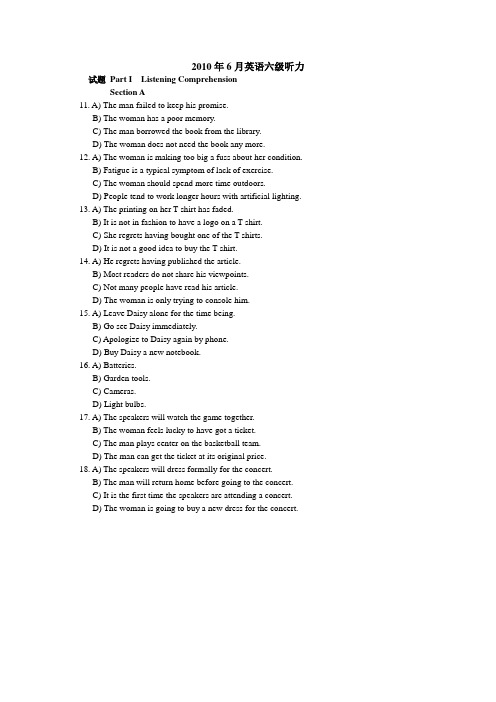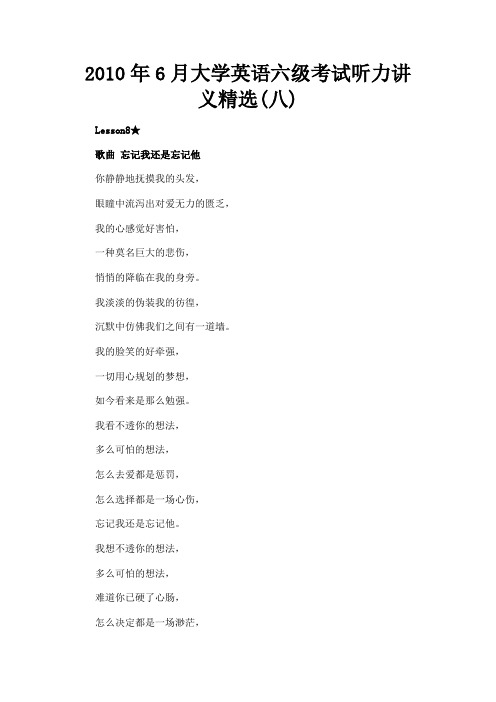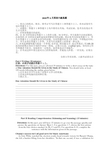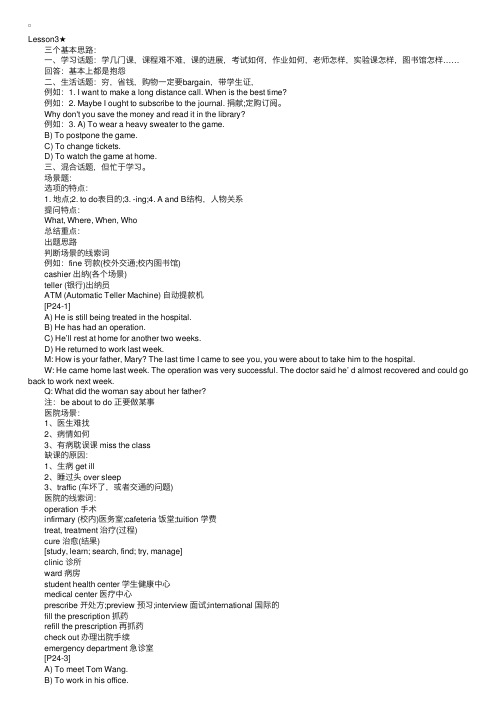[ti:][ar:][al:][by:九九Lrc歌词网~][02:23.52]College English Test—Band 6[02:26.88]Part III Listening Comprehension[02:30.15]Section A[02:32.75]Directions: In this section,[02:36.32]you will hear 8 short conversations[02:38.49]and 2 long conversations.[02:40.99]At the end of each conversation,[02:43.53]one or more questions will be asked about what was said. [02:47.82]Both the conversation and the questions[02:49.59]will be spoken only once.[02:52.01]After each question there will be a pause.[02:55.67]During the pause,[02:57.36]you must read the four choices marked A),[03:00.52]B), C) and D),[03:03.18]and decide which is the best answer.[03:05.62]Then mark the corresponding letter on Answer Sheet 2 [03:09.75]with a single line through the centre.[03:13.03]Now let’s begin with the eight short conversations.[03:18.89]11. M: Oh, I'm so sorry I forgot to bring along the book [03:24.05]you borrowed from the library.[03:26.10]W: What a terrible memory you have![03:28.82]Anyway, I won't need it until Friday night.[03:31.51]As long as I can get it by then, OK?[03:35.19]Q: What do we learn from this conversation?[03:51.33]12. W: Doctor, I haven't been able to get enough sleep lately, [03:56.82]and I'm too tired to concentrate in class.[03:59.56]M: Well, you know, spending too much time indoors [04:02.17]with all that artificial lighting can do that to you.[04:05.40]Your body loses track of whether it's day or night.[04:09.92]Q: What does the man imply?[04:25.89]13. M: I think I'll get one of those new T-shirts,[04:31.08]you know, with the school's logo[04:32.52]on both the front and the back.[04:34.52]W: You'll regret it.[04:35.84]They are expensive,[04:37.21]and I've heard the printing fades easily[04:39.16]when you wash them.[04:41.12]Q: What does the woman mean?[04:56.36]14. W: I think your article in the school newspaper[05:00.56]is right on target,[05:02.27]and your viewpoints have certainly convinced me.[05:05.30]M: Thanks, but in view of the general responses,[05:08.74]you and I are definitely in the minority.[05:12.20]Q: What does the man mean?[05:28.04]15. M: Daisy was furious yesterday[05:32.15]because I lost her notebook.[05:34.22]Should I go see her and apologize to her again?[05:37.57]W: Well, if I were you,[05:39.20]I'd let her cool off a few days before I approach her.[05:43.75]Q: What does the woman suggest the man do?[06:01.49]16. M: Would you please tell me[06:05.25]where I can get batteries for this brand of camera?[06:08.31]W: Let me have a look.[06:10.10]Oh, yes, go down this aisle, pass the garden tools,[06:14.66]you'll find them on the shelf next to the light bulbs.[06:18.70]Q: What is the man looking for?[06:35.05]17. M: Our basketball team is playing in the finals[06:40.06]but I don't have a ticket.[06:41.84]I guess I'll just watch it on TV.[06:44.39]Do you want to come over?[06:46.15]W: Actually I have a ticket, but I'm not feeling well.[06:50.13]You can have it for what it cost me.[06:53.76]Q: What do we learn from the conversation?[07:10.57]18. M: Honey,[07:12.82]I'll be going straight to the theatre from work this evening. [07:15.75]Could you bring my suit and tie along?[07:18.45]W: Sure.[07:19.32]It's the first performance of the States Symphony Orchestra [07:22.51]in our city, so suit and tie is a must.[07:26.57]Q: What do we learn from the conversation?[07:42.83]Now you’ll hear the two long conversations.[07:46.37]Conversation One[07:48.76]M: I got two letters this morning with job offers,[07:51.76]one from the Polytechnic,[07:53.80]and the other from the Language School in Pistoia, Italy. [07:57.91]W: So you're not sure which to go for?[08:00.71]M: That's it. Of course,[08:02.41]the conditions of work are very different:[08:04.83]The Polytechnic is offering a two-year contract[08:07.86]which could be renewed,[08:09.53]but the Language School is only offering a year's contract [08:12.96]and that's a definite minus.[08:14.93]It could be renewed, but you'll never know.[08:17.76]W: I see. So it's much less secure.[08:21.41]But you don't need to think too much about steady jobs[08:24.64]when you're only 23.[08:26.58]M: That's true.[08:27.68]W: What about the salaries?[08:29.78]M: Well, the Pistoia job pays much better in the short term. [08:33.70]I'll be getting the equivalent of about £22 000 a year there, [08:38.59]but only £20 000 of the Polytechnic.[08:41.82]But then the hours are different.[08:44.05]At the Polytechnic, I'd have to do 35 hours a week,[08:47.82]20 teaching and 15 administration,[08:50.89]whereas the Pistoia School is only asking for 30 hours' teaching. [08:55.34]W: Hmm...[08:56.75]M: Then the type of teaching is so different.[08:59.28]The Polytechnic is all adults and mostly preparation for exams, [09:03.59]like the Cambridge certificates.[09:05.38]The Language School wants me to do a bit of exam preparation, [09:08.89]but also quite a lot of work in companies and factories[09:12.15]and a couple of children's classes.[09:14.50]Oh, and a bit of literature teaching.[09:16.95]W: Well, that sounds much more varied and interesting.[09:20.02]And I'd imagine you would be doing quite a lot of[09:22.84]teaching outside the school and moving around quite a bit. [09:26.72]M: Yes, whereas with the Polytechnic position,[09:29.99]I'd be stuck in the school all day.[09:33.52]Questions 19 to 21 are based on the conversation[09:37.30]you have just heard.[09:40.51]19. What do we learn about the man from the conversation? [09:59.60]20. What do we learn about the students at the Polytechnic? [10:18.13]21. What does the woman think of the job at the Language School? [10:37.87]Conversation Two[10:40.59]W: Good evening,[10:41.58]and welcome to tonight's edition of “Legendary Lives.”[10:45.45]Our subject this evening is James Dean,[10:48.17]actor and hero for the young people of his time.[10:51.73]Edward Murray is the author of a new biography of Dean.[10:55.70]Good evening, Edward.[10:56.93]M: Hello, Tina.[10:57.98]W: Edward, tell us what you know about Dean's early life. [11:01.60]M: He was born in Indiana in 1931,[11:05.03]but his parents moved to California when he was five.[11:08.49]He wasn't there long, though,[11:10.21]because his mother passed away just four years later.[11:13.24]Jimmy's father sent him back to Indiana[11:15.71]after that to live with his aunt.[11:17.83]W: So how did he get into acting?[11:20.56]M: Well, first he acted in plays at high school,[11:23.99]then he went to college in California[11:26.51]where he got seriously into acting.[11:28.96]In 1951, he moved to New York to do more stage acting.[11:33.80]W: Then when did his movie career really start?[11:37.71]M: 1955. His first starring role was in East of Eden.[11:42.96]It was fabulous. Dean became a huge success.[11:46.44]But the movie that really made him famous[11:48.99]was his second one—Rebel Without a Cause,[11:52.34]that was about teenagers[11:53.86]who felt like they didn't fit into society.[11:56.63]W: So how many more movies did he make?[11:59.78]M: Just one more, then he died in a car crash[12:02.79]in California in 1955.[12:05.75]W: What a tragedy! He only made three movies.[12:09.49]So what made him the legend he still is today?[12:12.94]M: Well, I guess his looks, his acting ability,[12:16.75]his short life and maybe the type of character[12:20.19]he played in his movies.[12:22.06]Many young people saw him[12:23.62]as a symbol of American youths.[12:27.75]Questions 22 to 25 are based on the conversation[12:32.12]you have just heard.[12:34.62]22. What is the woman doing?[12:52.07]23. Why did James Dean move back to Indiana[12:57.29]when he was young?[13:12.18]24. What does the man say James Dean did at college[13:18.00]in California?[13:33.17]25. What do we learn about James Dean from the conversation? [13:52.65]Section B[13:54.21]Directions: In this section,[13:57.04]you will hear 3 short passages.[13:59.86]At the end of each passage,[14:01.83]you will hear some questions.[14:03.82]Both the passage and the questions will be spoken only once. [14:08.58]After you hear a question,[14:10.25]you must choose the best answer from the four choices [14:13.49]marked A), B), C) and D).[14:17.76]Then mark the corresponding letter on Answer Sheet 2[14:21.49]with a single line through the centre.[14:25.39]Passage One[14:27.22]The time is nine o'clock[14:28.81]and this is Marian Snow with the news.[14:31.76]The German authorities are sending investigators[14:35.11]to discover the cause of the plane crash late yesterday[14:38.33]on the island of Tenerife.[14:40.79]The plane, a Boeing 737,[14:43.33]taking German holiday makers to the island,[14:46.42]crashed into a hillside as it circled[14:48.95]while preparing to land.[14:51.06]The plane was carrying 180 passengers.[14:54.70]It's thought there are no survivors.[14:57.36]Rescue workers were at the scene.[15:04.21]The British industrialist James Louis,[15:06.63]held by kidnappers in Central Africa[15:09.01]for the past eight months,[15:10.57]was released unharmed yesterday.[15:13.13]The kidnappers had been demanding £1 million[15:16.27]for the release of Mr. Louis.[15:18.53]The London Bank and their agents[15:20.56]who have been negotiating with the kidnappers[15:23.20]have not said whether any amount of money has been paid. [15:32.90]The 500 UK motors workers[15:35.44]who had been on strike in High Town[15:37.45]for the past three weeks went back to work this morning. [15:41.25]This follows successful talks between management[15:44.21]and union representatives,[15:46.09]which resulted in a new agreement on[15:48.39]working hours and conditions.[15:50.44]A spokesman for the management said that[15:53.71]they'd hope they could now get back to producing cars, [15:57.01]and that they lost a lot of money and orders over this dispute. [16:05.01]And finally the weather.[16:07.12]After a cold start,[16:08.64]most of the country should be warm and sunny.[16:11.39]But towards late afternoon,[16:13.52]rain will spread from Scotland to cover most parts by midnight. [16:18.78]Questions 26 to 29 are based on the passage[16:21.97]you have just heard.[16:24.49]26. What does the news say about the Boeing 737 plane? [16:44.17]27. What happened to British industrialist James Louis? [17:03.54]28. How did the three-week strike in High Town end? [17:23.45]29. What kind of weather will be expected by midnight [17:28.96]in most parts of the country?[17:45.54]Passage Two[17:47.33]Juan Louis, a junior geology major,[17:50.69]decided to give an informative speech[17:53.01]about how earthquakes occur.[17:55.51]From his audience analysis he learned that[17:58.34]only two or three of his classmates[18:00.36]knew much of anything about geology.[18:03.33]Juan realized then that he must present his speech[18:06.61]at an elementary level[18:08.13]and with a minimum of scientific language.[18:12.74]As he prepared the speech, Juan kept asking himself, [18:16.93]“How can I make this clear and meaningful[18:19.95]to someone who knows nothing about earthquakes[18:22.37]or geological principles?”[18:26.31]Since he was speaking in the Midwest,[18:28.68]he decided to begin[18:30.21]by noting that the most severe earthquake[18:32.62]in American history took place not in California[18:36.26]or Alaska but at New Madrid, Missouri in 1811.[18:42.17]If such an earthquake happened today,[18:45.15]it would be felt from the Rocky Mountains[18:47.38]to the Atlantic Ocean[18:48.77]and would flatten most of the cities in the Mississippi valley. [18:53.01]That, he figured, should get his classmates' attention. [18:58.01]Throughout the body of the speech,[19:00.36]Juan dealt only with the basic mechanics of earthquakes, [19:04.01]and carefully avoided technical terms.[19:07.42]He also prepared visual aids, diagramming fault line, [19:11.84]so his classmates wouldn't get confused.[19:15.74]To be absolutely safe, Juan asked his roommate,[19:20.36]who was not a geology major, to listen to the speech. [19:24.89]“Stop me,” he said,[19:26.32]“any time I say something you don't understand.”[19:30.79]Juan's roommate stopped him four times.[19:33.68]And at each spot,[19:35.18]Juan worked out a way to make his point more clearly. [19:39.40]Finally, he had a speech that was interesting[19:42.64]and perfectly understandable to his audience.[19:47.85]Questions 30 to 32 are based on the passage[19:51.74]you have just heard.[19:54.54]30. What did Juan Louis learn from the analysis[19:59.53]of his audience?[20:14.71]31. How did Juan Louis start his speech?[20:33.19]32. What did Juan ask his roommate to do[20:37.16]when he was making his trial speech?[20:53.74]Passage Three[20:56.22]Esperanto is an artificial language,[20:58.87]designed to serve internationally[21:01.28]as an auxiliary means of communication[21:04.33]among speakers of different languages.[21:07.40]It was created by Ludwig Lazar Zamenhof,[21:10.92]a polish Jewish doctor specialized in eye diseases.[21:15.46]Esperanto was first presented in 1887.[21:19.05]An international movement was launched to promote its use. [21:23.83]Despite arguments and disagreements,[21:26.42]the movement has continued to flourish[21:29.01]and has members in more than 80 countries.[21:32.23]Esperanto is used internationally[21:34.75]across language boundaries by at least 1 million people, [21:39.07]particularly in specialized fields.[21:42.20]It is used in personal contexts,[21:44.57]on radio broadcasts and in a number of publications, [21:49.00]as well as in translations of both modern works and classics. [21:53.28]Its popularity has spread from Europe,[21:55.71]both east and west,[21:57.52]to such countries as Brazil and Japan.[22:01.08]It is, however, in China[22:03.07]that Esperanto has had its greatest impact.[22:06.83]It is taught in universities and used in many translations, [22:11.38]often in scientific or technological works.[22:15.21]EL POPOLA CHINIO,[22:17.03]which means from people's China,[22:19.55]is a monthly magazine in Esperanto and is read worldwide. [22:24.99]Radio Beijing's Esperanto program is the[22:28.23]most popular program in Esperanto in the world.[22:31.95]Esperanto's vocabulary is drawn primarily from Latin, [22:35.90]the Roman's languages,[22:37.65]English and German.[22:39.80]Spelling is completely regular.[22:42.66]A simple and consistent set of endings indicates[22:46.08]grammatical functions of words.[22:48.31]Thus for example,[22:50.12]every noun ends in “o,”[22:52.65]every adjective in “a,”[22:54.86]and the basic form of every verb in “i.”[22:58.95]Esperanto also has a highly productive system of[23:02.63]constructing new words from old ones.[23:06.37]Questions 33 to 35 are based on the passage[23:10.31]you have just heard.[23:12.78]33. What does the speaker tell us about Esperanto?[23:31.86]34. What is said about the international movement[23:36.43]to promote the use of Esperanto?[23:52.58]35. What does the speaker say about Esperanto in China? [24:14.84]Section C[24:16.24]Directions: In this section,[24:19.30]you will hear a passage three times.[24:21.68]When the passage is read for the first time,[24:24.42]you should listen carefully for its general idea.[24:27.85]When the passage is read for the second time,[24:30.84]you are required to fill in the blanks numbered from 36 to 43[24:35.84]with the exact words you have just heard.[24:38.54]For blanks numbered from 44 to 46[24:42.83]you are required to fill in the missing information.[24:46.55]For these blanks,[24:47.81]you can either use the exact words you have just heard[24:51.04]or write down the main points in your own words.[24:54.32]Finally, when the passage is read for the third time,[24:58.97]you should check what you have written.[25:01.87]Now listen to the passage.[25:05.47]George Herbert Mead said that[25:07.11]humans are talked into humanity.[25:10.02]He meant that we gain personal identity[25:12.78]as we communicate with others.[25:15.41]In the earliest years of our lives,[25:18.00]our parents tell us who we are.[25:20.63]“You're intelligent.” “You're so strong.”[25:23.91]We first see ourselves through the eyes of others,[25:27.70]so their messages form important foundations[25:30.32]of our self-concepts.[25:32.59]Later we interact with teachers,[25:35.38]friends, romantic partners,[25:37.91]and co-workers who communicate their views of us.[25:42.16]Thus, how we see ourselves reflects[25:45.17]the views of us that others communicate.[25:49.10]The profound connection between identity[25:51.88]and communication is dramatically evident in children[25:54.74]who are deprived of human contact.[25:58.30]Case studies of children[25:59.37]who were isolated from others reveal[26:01.54]that they lack a firm self-concept,[26:04.31]and their mental and psychological development[26:06.49]is severely hindered by lack of language.[26:10.53]Communication with others not only affects our sense of identity [26:14.96]but also directly influences our physical and emotional well-being. [26:20.27]Consistently, research shows that[26:23.11]communicating with others promotes health,[26:25.72]whereas social isolation is linked to stress, disease[26:30.13]and early death.[26:32.27]People who lack close friends have greater levels of anxiety [26:35.90]and depression than people who are close to others.[26:38.99]A group of researchers reviewed scores of studies[26:42.30]that traced the relationship[26:43.67]between health and interaction with others.[26:47.04]The conclusion was that social isolation is statistically[26:51.34]as dangerous as high blood pressure,[26:53.53]smoking and obesity.[26:55.95]Many doctors and researchers believe that[26:59.00]loneliness harms the immune system,[27:01.81]making us more vulnerable to a range of minor[27:04.48]and major illnesses.[27:08.81]Now the passage will be read again.[27:12.83]George Herbert Mead said that[27:14.91]humans are talked into humanity.[27:18.17]He meant that we gain personal identity[27:20.69]as we communicate with others.[27:23.41]In the earliest years of our lives,[27:25.69]our parents tell us who we are.[27:28.17]“You're intelligent.” “You're so strong.”[27:31.95]We first see ourselves through the eyes of others,[27:36.08]so their messages form important foundations[27:38.78]of our self-concepts.[27:41.05]Later we interact with teachers,[27:43.34]friends, romantic partners,[27:45.48]and co-workers who communicate their views of us.[27:49.46]Thus, how we see ourselves reflects[27:51.95]the views of us that others communicate.[27:55.49]The profound connection between identity[27:57.69]and communication is dramatically evident in children[28:01.40]who are deprived of human contact.[28:04.38]Case studies of children[28:05.52]who were isolated from others reveal[28:07.93]that they lack a firm self-concept,[28:10.78]and their mental and psychological development[28:13.16]is severely hindered by lack of language.[28:16.34]Communication with others not only affects our sense of identity [28:20.92]but also directly influences our physical and emotional well-being. [28:26.29]Consistently, research shows that[28:29.49]communicating with others promotes health,[28:32.19]whereas social isolation is linked to stress, disease[28:35.96]and early death.[28:37.78][30:09.76]People who lack close friends have greater levels of anxiety [30:13.42]and depression than people who are close to others.[30:17.37]A group of researchers reviewed scores of studies[30:20.45]that traced the relationship[30:22.05]between health and interaction with others.[30:25.85][31:48.92]The conclusion was that social isolation is statistically[31:53.20]as dangerous as high blood pressure,[31:55.27]smoking and obesity.[31:57.60]Many doctors and researchers believe that[32:00.11]loneliness harms the immune system,[32:02.61]making us more vulnerable to a range of minor[32:05.49]and major illnesses.[32:08.16][33:16.39]Now the passage will be read for the third time.[33:20.54]George Herbert Mead said that[33:22.17]humans are talked into humanity.[33:25.22]He meant that we gain personal identity[33:27.83]as we communicate with others.[33:30.50]In the earliest years of our lives,[33:33.07]our parents tell us who we are.[33:35.71]“You're intelligent.” “You're so strong.”[33:39.10]We first see ourselves through the eyes of others,[33:42.83]so their messages form important foundations[33:45.30]of our self-concepts.[33:47.77]Later we interact with teachers,[33:50.57]friends, romantic partners,[33:52.87]and co-workers who communicate their views of us.[33:57.25]Thus, how we see ourselves reflects[34:00.20]the views of us that others communicate.[34:03.64]The profound connection between identity[34:06.87]and communication is dramatically evident in children[34:09.73]who are deprived of human contact.[34:12.54]Case studies of children[34:14.34]who were isolated from others reveal[34:16.39]that they lack a firm self-concept,[34:19.06]and their mental and psychological development[34:21.59]is severely hindered by lack of language.[34:25.33]Communication with others not only affects our sense of identity [34:30.03]but also directly influences our physical and emotional well-being. [34:35.38]Consistently, research shows that[34:38.23]communicating with others promotes health,[34:40.92]whereas social isolation is linked to stress, disease[34:45.46]and early death.[34:47.46]People who lack close friends have greater levels of anxiety [34:50.97]and depression than people who are close to others.[34:54.30]A group of researchers reviewed scores of studies[34:57.40]that traced the relationship[34:58.78]between health and interaction with others.[35:02.24]The conclusion was that social isolation is statistically[35:06.39]as dangerous as high blood pressure,[35:08.68]smoking and obesity.[35:11.35]Many doctors and researchers believe that[35:14.11]loneliness harms the immune system,[35:16.93]making us more vulnerable to a range of minor[35:19.52]and major illnesses.[35:23.93]This is the end of listening comprehension.。
















